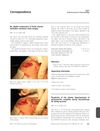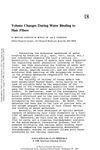 June 2022 in “Frontiers in Medicine”
June 2022 in “Frontiers in Medicine” Acupuncture and moxibustion may help treat hair loss, but more research is needed.
 4 citations,
January 2022 in “Journal of Bioscience and Bioengineering”
4 citations,
January 2022 in “Journal of Bioscience and Bioengineering” Electric stimulation can increase hair growth by activating certain genes in skin cells.
 April 2024 in “Indian journal of ophthalmology. Case reports”
April 2024 in “Indian journal of ophthalmology. Case reports” Using minoxidil for hair loss might rarely cause a vision problem where fluid builds up under the retina.
 January 2025 in “Yonsei Medical Journal”
January 2025 in “Yonsei Medical Journal” Mastic gum and peppermint extracts may promote hair growth and health.
 September 2016 in “Springer eBooks”
September 2016 in “Springer eBooks” Fat-derived stem cells may help treat skin aging and hair loss.
 30 citations,
April 2020 in “Stem Cell Research & Therapy”
30 citations,
April 2020 in “Stem Cell Research & Therapy” PI3K/Akt pathway is crucial for hair growth and regeneration.
 2 citations,
August 2013 in “British Journal of Dermatology”
2 citations,
August 2013 in “British Journal of Dermatology” Chemotherapy improved a girl's painful foot condition linked to pachyonychia congenita.
 8 citations,
May 2021 in “Bioengineering & translational medicine”
8 citations,
May 2021 in “Bioengineering & translational medicine” Hair growth environment recreated with challenges; stem cells make successful skin organoids.
 3 citations,
July 2022 in “Dermatologic Therapy”
3 citations,
July 2022 in “Dermatologic Therapy” Magnesium microneedle patches can safely improve under-eye wrinkles when used every other night for 12 weeks.
21 citations,
June 2016 in “PloS one” Zebrafish need MYC and FGF to regenerate inner ear hair cells.
143 citations,
January 2004 in “Journal of Investigative Dermatology Symposium Proceedings” Alopecia areata is an autoimmune disease causing hair loss, treatable with immune-modulating drugs, and linked to genetics.
1 citations,
December 2020 in “International journal of molecular sciences” External factors can cause skin cancer cells that usually don't spread to grow and form tumors in mice.
 3 citations,
August 1980 in “Acs Symposium Series”
3 citations,
August 1980 in “Acs Symposium Series” Hair increases in size when it absorbs water, and treatments like bleaching affect how much water it can take in.
 3 citations,
August 2020 in “PubMed”
3 citations,
August 2020 in “PubMed” Platelet-rich plasma (PRP) is effective in treating various skin conditions and improving hair density, thickness, and patient satisfaction, with lower relapse rates for Alopecia Areata.

Minoxidil helps stimulate hair growth and enlarge small follicles in common hair loss, but doesn't stop it, and its effects can be boosted when combined with finasteride.
 8 citations,
January 2015 in “Genetics and molecular research”
8 citations,
January 2015 in “Genetics and molecular research” Researchers found four key proteins that affect the development of a specific hair type in Yangtze River Delta white goats.
 April 2017 in “The journal of investigative dermatology/Journal of investigative dermatology”
April 2017 in “The journal of investigative dermatology/Journal of investigative dermatology” CD101 is highly effective in treating dermatophytosis in guinea pigs.
 January 2015 in “Indian Journal of Dermatology, Venereology and Leprology”
January 2015 in “Indian Journal of Dermatology, Venereology and Leprology” The document concludes that various skin conditions have specific characteristics and treatments, and highlights the importance of vitamin D in managing these dermatological issues.
 1 citations,
January 2023 in “Journal of pharmaceutical and biological sciences”
1 citations,
January 2023 in “Journal of pharmaceutical and biological sciences” Ethosomes are a promising way to deliver drugs through the skin.
 1 citations,
January 2023 in “Burns and trauma”
1 citations,
January 2023 in “Burns and trauma” Tiny particles from 3D-grown skin cells speed up wound healing by promoting blood vessel growth.
 25 citations,
January 2002 in “Folia Pharmacologica Japonica”
25 citations,
January 2002 in “Folia Pharmacologica Japonica” Minoxidil helps hair grow by improving blood flow and increasing growth factors in hair follicles.
 29 citations,
January 2018 in “International Journal of Trichology”
29 citations,
January 2018 in “International Journal of Trichology” PRP treatment helps hair growth and density with 70.7% success, but more research needed.
 March 2018 in “John Wiley & Sons, Ltd eBooks”
March 2018 in “John Wiley & Sons, Ltd eBooks” Surgical therapies for vitiligo vary in effectiveness, with combination therapy and medical tattooing recommended for better results.
 33 citations,
July 2021 in “Clinical, Cosmetic and Investigational Dermatology”
33 citations,
July 2021 in “Clinical, Cosmetic and Investigational Dermatology” Nanocarrier technology in cosmetics improves ingredient delivery and effectiveness while reducing side effects.
3 citations,
August 2021 in “European journal of medical research” Microbial biofilms may cause red scrotum syndrome.
June 2023 in “Clinical Cosmetic and Investigational Dermatology” The new technique effectively treats hairline vitiligo with repigmentation and hair regrowth.
 58 citations,
November 2013 in “Journal of Innovative Optical Health Sciences”
58 citations,
November 2013 in “Journal of Innovative Optical Health Sciences” Multiphoton microscopy is a promising tool for detailed skin imaging and could improve patient care if its challenges are addressed.
January 2020 in “Springer eBooks”  June 2022 in “Authorea (Authorea)”
June 2022 in “Authorea (Authorea)” Efficient delivery systems are needed for the clinical use of CRISPR-Cas9 gene editing.
 39 citations,
August 2018 in “Scientific reports”
39 citations,
August 2018 in “Scientific reports” Claudin-1 is important for the barrier function and growth of hair.
























